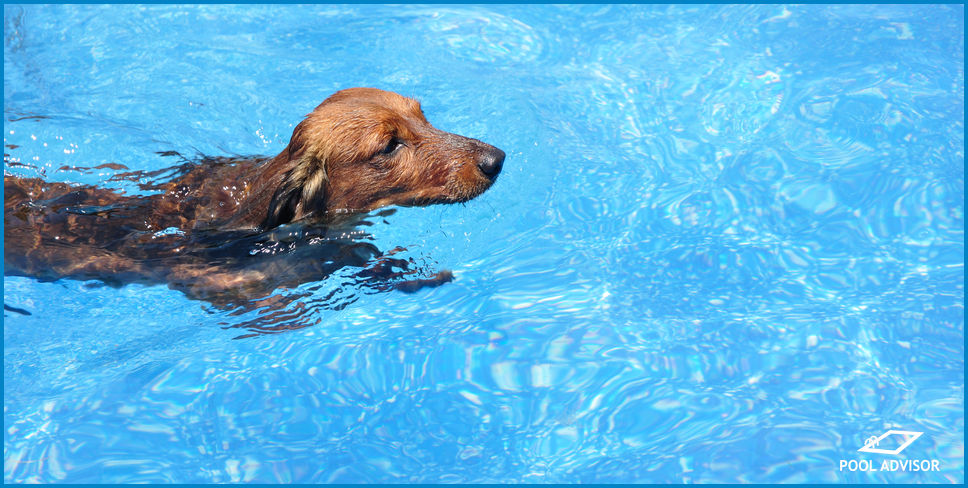
Can Dogs Swim In Chlorine Pools? Answered
If you are a new pool owner or a new dog owner, you may be wondering if dogs can swim in chlorine pools. Chlorine can sometimes be considered a harsh chemical, and many pet owners wonder if this chemical has any negative effects on their dog.
In this article, we will talk about whether or not dogs can swim in chlorine pools, potential problems with dogs swimming in pools, and if dogs contaminate your pool when swimming.
Can Dogs Swim In Chlorine Pools?
Yes, dogs can swim in chlorine pools. Although dogs should only be allowed to swim when they are under direct supervision, chlorine pools are perfectly fine for dogs to swim in provided that the chemistry is well-maintained and within normal levels.
In fact, just like with humans, there are some benefits to allowing your pup to swim in chlorinated water rather than fresh water.
Natural bodies of water tend to contain lots of organic bacteria, parasites, and other contaminants, all of which are capable of affecting your dog. In a chlorine pool, there is a significantly reduced chance of your dog contracting waterborne illness.
Can Dogs Swim In Saltwater Pools?
Dogs can also swim in saltwater pools. Just like in chlorine pools, saltwater pools are adequately sanitised to reduce the presence of microorganisms in your water, which makes the water safer for humans and pets alike.
You typically don’t need to worry about the salt content affecting your dog, because the amount of salt in pools is significantly less concentrated than seawater.
Potential Problems
Consuming Pool Water
Dogs should always be supervised when swimming in pools. This is not only to prevent accidental drownings, but also prevents them from consuming large amounts of pool water.
Although pets must consume a significant amount of pool water before it will have a bad effect, it is not a good idea to let your pet develop the habit of drinking from the pool.
If they consume enough chlorine, they may vomit it back up.
Irritated Skin
Some dogs can develop irritated skin after swimming in chlorine pools or saltwater pools. Typically, if your dog has a skin reaction, it is advisable to prevent them from swimming in the pool in the future.
If this is difficult, you may instead consider thoroughly rinsing your dog with fresh water after they exit the swimming pool to reduce the chance of skin irritation.
Also double check your water chemistry - your high free chlorine might be the culprit.
Do Dogs Contaminate Pools?
Although dogs can swim in your pool, they may introduce a significant amount of pollution to it.
Dogs are, unsurprisingly, less clean than humans and are prone to shedding hair into your water. A buildup of dog-related debris can lead to the development of chloramines in your pool, a type of combined chlorine that produces a strong chlorine odour.
This can soak up your free chlorine, sending it to zero and increasing the likelihood of algae and bacteria outbreaks.
Cleaning Your Pool After Dogs
After allowing dogs to swim in your pool, it is recommended that you take extra steps to clean it, as your free chlorine is likely quite low now. This extra cleaning process should typically contain a shock treatment, which can be chlorine based or a non-chlorine formula.
Our favourite non-chlorine shock is Shock N Swim by Lo-Chlor. This product has an especially quick action time of around fifteen minutes, allowing you to achieve sanitation very quickly and prepare your pool for more swimmers.
This shock treatment also contains some clarifier, which works to remove small particles of debris from your water and keep it crystal clear.
If your dog introduced any hair to the pool, it is important to try to remove as much of this as possible. Hair in your pool water can cause the development of chloramines, and is also unappealing to other swimmers.
To remove hair, use a dip net to gather as much as possible. Regularly empty any skimmer baskets, and ensure that hair has not entered your filter unit.
If your dog has short hair, it is more likely for their hair to end up in the filter unit of your pool. Although small amounts of this are completely harmless, if your dog swims regularly, you may want to rinse or backwash your filter to remove some of this built up hair.
Conclusion
It is perfectly safe for dogs to swim in chlorine pools provided that they are fully supervised and are equipped with any safety devices that they need.
Although dogs should never be left unattended when they are swimming or near the pool and should also not be allowed to drink excess pool water, most dogs enjoy playing in the pool especially when their owner joins them.
Do you have any questions about whether dogs can swim in chlorine pools? Leave us a comment down below, we’d love to help!

Louis
A chemical engineer by trade, Louis is committed to debunking myths in the pool industry by explaining the underlying chemistry and making it accessible to all.
